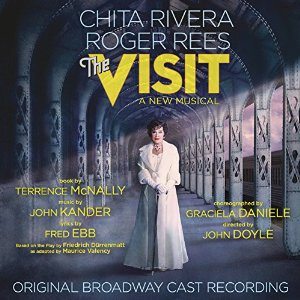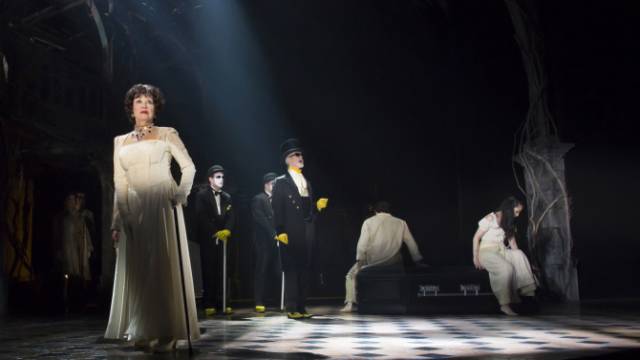
 The storied journey of The Visit to Broadway has been recounted many times, in 2015, fourteen years after its first planned tryout, The Visit finally made it to Broadway. It was a short two month visit, during which it earned five Tony nominations, and then it closed. It's been a few weeks after its closing and what do we have to show for it other than the memories those who saw the show were lucky to cultivate? A new cast cast recording. Is it enough? Is any cast recording ever enough to represent a show which has closed? Perhaps not. But as a memento for some of the aspects of The Visit which seem most essential the cast recording is a treasure.
The storied journey of The Visit to Broadway has been recounted many times, in 2015, fourteen years after its first planned tryout, The Visit finally made it to Broadway. It was a short two month visit, during which it earned five Tony nominations, and then it closed. It's been a few weeks after its closing and what do we have to show for it other than the memories those who saw the show were lucky to cultivate? A new cast cast recording. Is it enough? Is any cast recording ever enough to represent a show which has closed? Perhaps not. But as a memento for some of the aspects of The Visit which seem most essential the cast recording is a treasure.
Even before The Visit finally premiered on Broadway during the 2014-2015 season its entire existence had seemed just a little too self-referential and recursive to ignore. In one of its first full songs “At Last” the woman at the centre (a marvellous Chita Rivera, but more on her later) says, “The time had to be right for this visit, I wasn’t ready. Neither was Brachen.” From the show's early closing it might seem neither was Broadway, but if Broadway audiences were not ready for the show, theatre lovers from New York and further are more than ready for this final Ebb and Kander score. Ah, yes, it’s that cloud of sadness which overwhelms any listen of this “new” score. New parenthetically put because this journey has been long. The overwhelmingly specific casting of Chita Rivera as Claire Zachanassian feels particularly deliberate, but for me listening to the score it was overwhelming how much Claire’s return to Brachen feels like a representation of Ebb’s own visit to us after his death 11 years ago. After his untimely death in 2004, this is the third Ebb and Kander musical to open on Broadway after Curtains and The Scottsboro Boys. So when in one of many self-referential lyrics the Schoolmaster of Brachen talks about, "finding the chilling, a ghost on a visit from the past", his words resound.
It was never going to be easy to adapt Friedrich Dürrenmatt's play to a musical. It’s billed as a satire but the play’s darkness has always been its pervading tone. Ebb and Kander, then, were always an obvious choice. They have taken pleasure in examining the darker aspects of life in musical theatre. In an unfair memory, they are relegated to bringing the razzle dazzle to theatre but to see Cabaret and Chicago for "razzle" and miss the underbelly of decrepitude is to miss Ebb and Kander, wholly and beyond the more notable ones are the tales of domestic strife in The Rink or American horrors in The Scottsboro Boys. This is a song Ebb and Kander know, and a song they know well. The eponymous visit tells of Claire Zachanassian who returns to her decrepit home town to confront the man she loves. She wants his dead body and in return she will give the town the money it needs to flourish. There’s the requisite handwringing but we know the lover’s fate is sealed. Even before the mid act “Eunuch’s Testimony” which turns the plot on its head, Kander’s music is signalling doom. In one of the few songs which threaten happiness (the gorgeous much too short duet / quartet "You, You, You") the younger selves of Claire and Anton combine with their older selves to sing of their lost love. Even before we truly know it we know this visit will end badly just by the way the music never flows sweetly, the hint of discord is ever present and precise. It’s a reason The Visit might not make for a conventionally pleasant listen, but The Visit does not give us what we want, it gives us essential music we need.
There are elements of The Visit which remind of another gorgeous but reportedly "difficult" and implacable score: Stephen Sondheim’s Passion, there, like here, the music takes on an almost recitative quality where lyrics becomes subsumed in the melody. The Visit is not as bullishly focused on a specific tenor but the hints are there. The early show from "I Know Claire" through "A Happy Ending" to "You, You, You" to "I Must Have Been Something" to "Look at Me" all contain a constant reverberation, pulsing the music forward always with the undertone (then overtone) of unease. It’s some excellent work with Kander with Ebb’s lyrics indicating repetition but not too much to oversell it.
 This visit is really about Claire and Anton but the songwriters are not blinded by the leads building to an ensemble number, "Yellow Shoes", arguably the peppiest number of the score also too overwhelms with its undertones of guilt. Guilt is probably the best word to describe this score, it never settles to peacefulness or true happiness instead taking on its characters' issues. It might be a difficult score for those expecting the most toe-tapping of Ebb and Kander tunes but this score is gorgeous and rich and the packaging and delivery by Broadway Records is pristine. The digital booklet includes lyrics, images and two introductions by John Doyle (director) and Terrence McNally (libretto), the latter of whom calls this the pair’s best score.
This visit is really about Claire and Anton but the songwriters are not blinded by the leads building to an ensemble number, "Yellow Shoes", arguably the peppiest number of the score also too overwhelms with its undertones of guilt. Guilt is probably the best word to describe this score, it never settles to peacefulness or true happiness instead taking on its characters' issues. It might be a difficult score for those expecting the most toe-tapping of Ebb and Kander tunes but this score is gorgeous and rich and the packaging and delivery by Broadway Records is pristine. The digital booklet includes lyrics, images and two introductions by John Doyle (director) and Terrence McNally (libretto), the latter of whom calls this the pair’s best score.
And part of that essentiality comes to the woman at its centre. It is impossible to remove Chita from the equation of what makes The Visit work. Chita’s work with Ebb and Kander since she originated the role of Velma Kelly on Broadway has been iconic and it’s lead up to her finest vocal work on the 1984 cast recording of The Rink, here she continues her singular ability to make every note specifically "Chita". Rivera has always been a performer who zeroes in on the minor things turning them into major things. She caresses a note and though belting purists will say she’s not the finest singer her voice is so inimitable, like the way she croons, "Because, I own it. I own it, hmmm.” There’s something ineffably Chita about the way she pronounces words, the way her voice lilts on the simple words like “cuckoo clocks” (same goes for her summit number "Love and Love Alone" where the lyrics indicate simple singing of scales “la la la la” but Chita’s own delivery is more than just simple or simplistic). Chita is The Visit to a large degree but not only.
The recording highlights the fine ensemble from the eerie eunuchs excellently voiced by Matthew Deming and Chris Newcomer, and an excellent Mary Beth Peil who (alas) has no solo number but thrills on the edges and in dialogue numbers as Anton's wife. A great supporting treat on the recording is a rousing number from Jason Danieley which threatens to steal focus from our leading dilemma. As the schoolmaster who is the only village person wrestling with the moral predicament of Claire’s visit he sounds gorgeous on the song which veers into the sentimental, but beautifully so. The sentimental isn’t essentially without worth. Much has been said about Roger Rees being unable to match Rivera, and on the numbers where his younger self (sung by John Riddle) sings beautifully, the divergence between young full voiced Anton and the older, frailer one is potent. But The Visit then becomes to me a rumination on growing older. For Claire, excellently voiced by Chita, with an axe to grind she sounds as young and expressive as she did on The Rink. Rees, older, and more uncertain embodies Anton not glamorously, but honestly. The frailty lends a note of potent despair to the misguided solo “I Know Claire”.
The Visit’s alleged inability to mix its darkness with its sentimentality, as if the latter has put the former in jeopardy, has been the object of many discussions. And yet, to listen to the score, though, is to be faced with the fact that the two may not be mutually exclusive. The song “Love and Love Alone” is the key to it all, though. Unsurprisingly. It is the obvious eleven o’clock number which the show seems to be building to, but the number is much more impressive than its surface level beauty (it features some gorgeous music from Kander). The song brilliantly ties the macabre nature of the play with its simultaneously sentimental side. It has, perhaps, always been the largest issue facing The Visit which in some deft changes to its source is just a bit warmer. It is flippant to say the score’s ethos is that love makes you do unusual things but it is Claire’s sentimentality which evokes the dark feelings the song invokes. it is the song which seems to easily rise as the one most feted. I’m not sure (the score has many heights even if they are not obvious) but it is a defiant piece and the music to the pas de deux Claire dances with her younger self is on first thought some of the best music I’ve ever heard Kander compose. To banish sentimentality from The Visit is to miss much which makes the score work.
How lucky for us that we have been given this chance to have a visit from Ebb as this great composing duo of Ebb and Kander make another “new” musical on the stage. It’s only fitting that this piece to potentially cap their career is as unflinching and unusual as they begun, because we’ll think of Chicago and how it has seeped into consciousness but The Visit is like the piece that started it – Flora the Red Menace, the first show the two worked on together. A brilliant theatre lover pointed out this delightful curio. Delightful symmetry indeed. Like Flora, like Claire, like the Spiderwoman, like Velma, like Anna, Claire's plea in The Visit is not easy and we must to come it on its own terms...I think we will be better for having experienced it.